Big Red Book
Celebrating television's This Is Your Life
Professors Ray and Trevor POWLES (1938-)
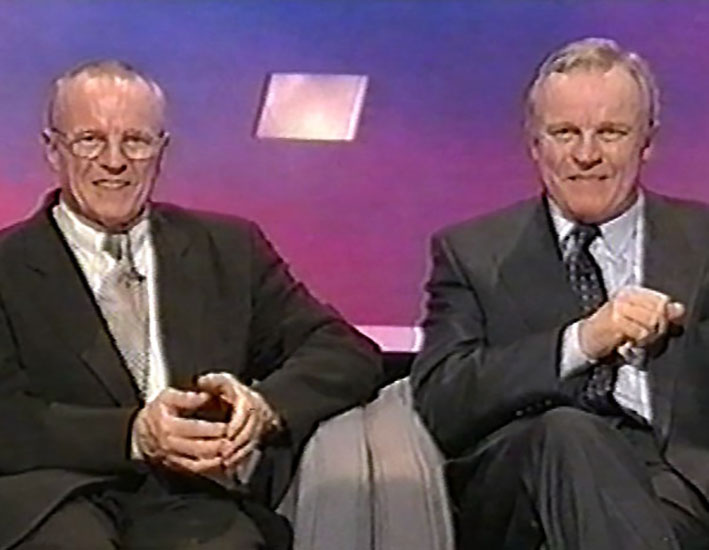
- The only set of twins to be featured as a pair of subjects on This Is Your Life
THIS IS YOUR LIFE - Ray and Trevor Powles, physicians and cancer specialists, were surprised by Michael Aspel at the Royal Marsden Hospital in Sutton, Surrey, having been led to believe they were being interviewed by the BBC for a programme about the NHS.
The twin brothers, who were brought up in Greenwich, London, both qualified as doctors in 1964, having studied at St Bartholomew's Hospital. Initially, they worked at different hospitals, but by 1971 they were both based at the Royal Marsden, where they became pioneers in patient care.
Their units at the hospital became internationally famous, as Ray, who was Physician-in-Charge and Group Head for Haemato-Oncology at the Leukaemia and Myeloma Unit, performed the first successful bone marrow transplant in Europe in 1973, and Trevor, who ran the breast cancer unit, carried out the world's first breast cancer trial.
"I'm stunned! I can't believe I got caught on that! Jolly, how extraordinary!"
programme details...
- Edition No: 1094
- Subject Nos: 1069-1070
- Broadcast date: Wed 20 Feb 2002
- Broadcast time: 8.00-8.30pm
- Recorded: Mon 18 Feb 2002
- Venue: Teddington Studios
- Series: 42
- Edition: 15
- Code name: Double
on the guest list...
- Vera Lynn
- Diana Moran
- Henry Kelly
- Louise - Ray's wife
- Penny - Trevor's wife
- Cally Palmer
- Prof Dame Lesley Rees
- Tim Herbert
- James - Trevor's son
- Emma - Trevor's daughter-in-law
- Tom - Trevor's son
- Lucy - Trevor's daughter
- Sam - Ray's son
- Luke - Ray's son
- Ella - Ray's daughter
- Max - Ray's son
- Ian Cuneen
- Alan Lack
- Stuart Lack
- Eunice Lack
- Pat MacKay
- Ian Smith
- Susan Smith
- Prof Sandy Patterson Filmed tributes:
- Jean Edwards
- Joan Muir
- Glynis Knowles
- Gavin Maynard-Wyatt
- Patricia Ryan
- Annabel Littlewood
- Maria Mitchell
- Bhawna Sirohi
- Cathy Shipton
- Kwame Kwei-Armah
- Adjoa Andoh
- Westlife
- Gianfranco Zola
- Marcel Desailly
- Prof Donall Thomas
- Prof Magdi Yacoub
related appearance...
- Margaret Hayles - Feb 1989 - Ray only
production team...
- Researchers: Melanie Clarkson, Sue Scott
- Writer: Joe Steeples
- Director: John Gorman
- Associate Producer: Helen Gordon-Smith
- Executive Producer: John Longley
- Series Producer: Jack Crawshaw
- Producer: Sue Green
- names above in bold indicate subjects of This Is Your Life
examining the medical profession
keeping it in the family
two's company
the show's fifty year history
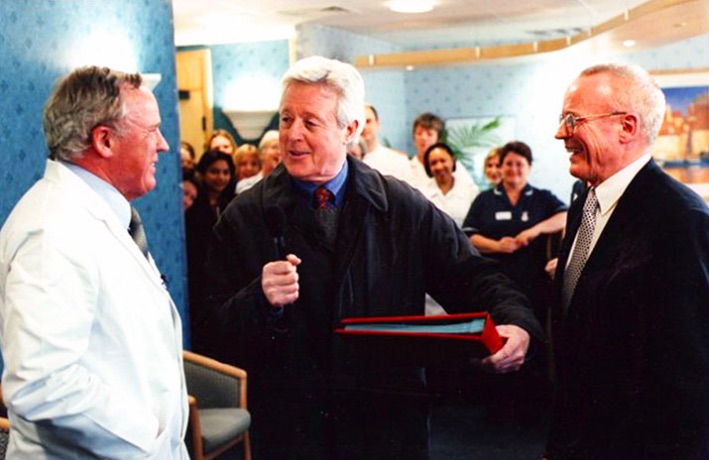
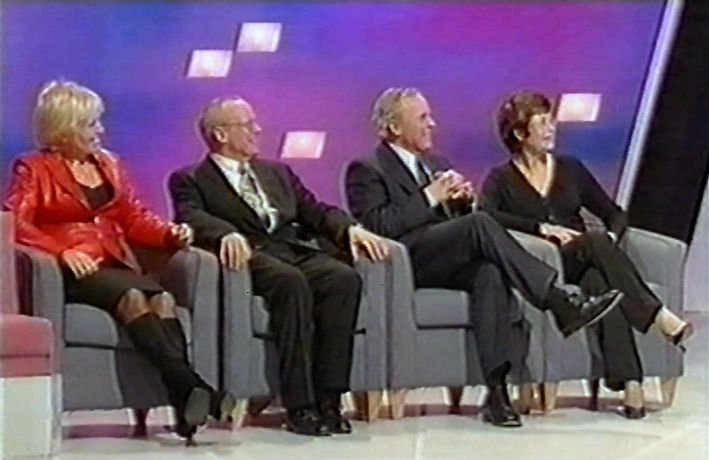
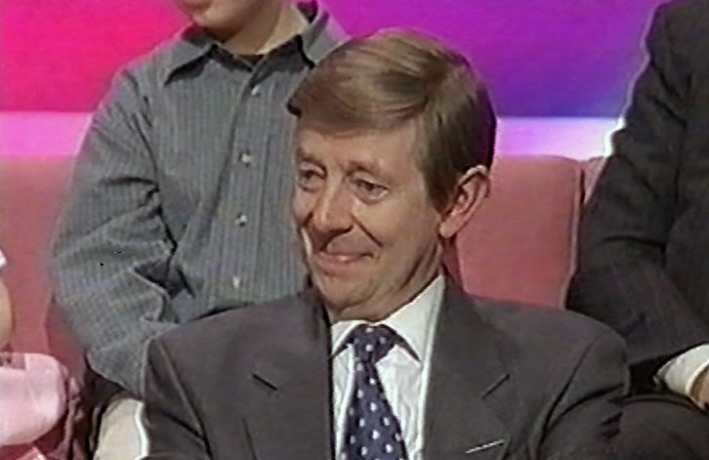
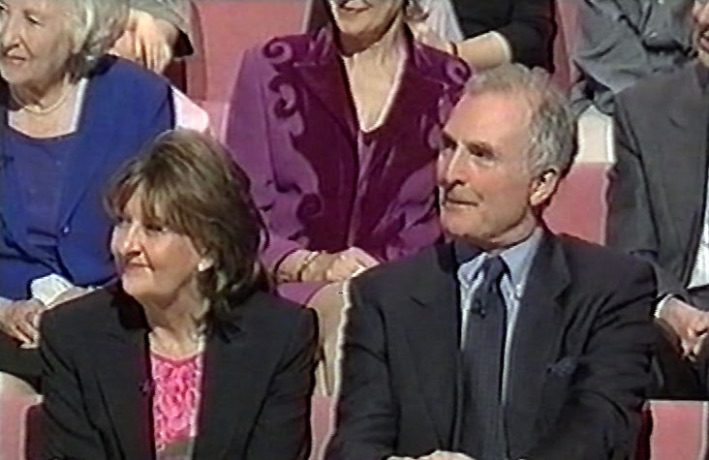
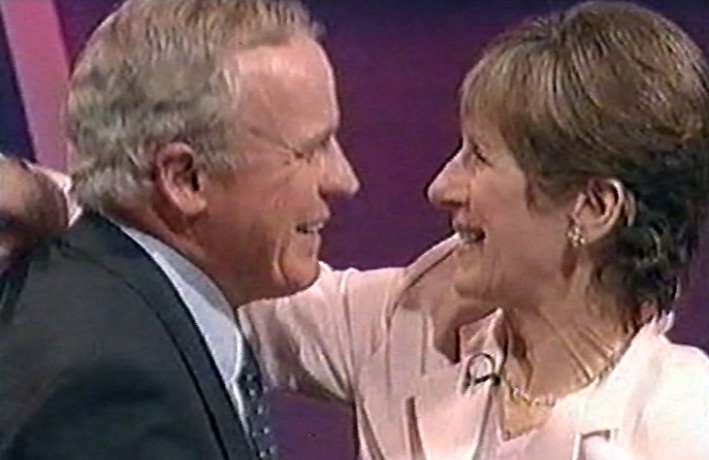
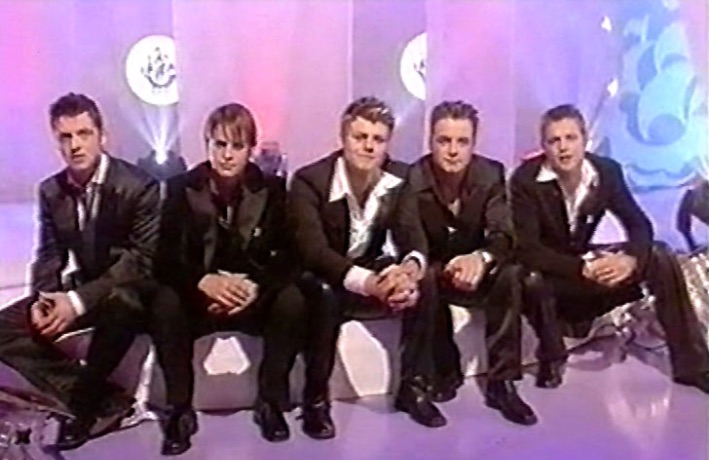
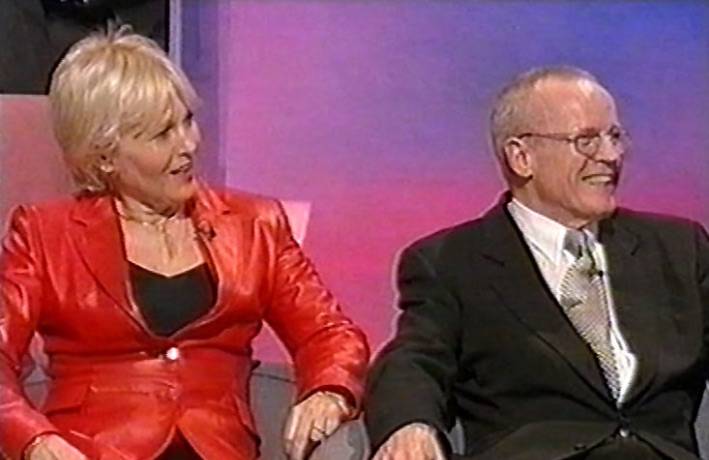
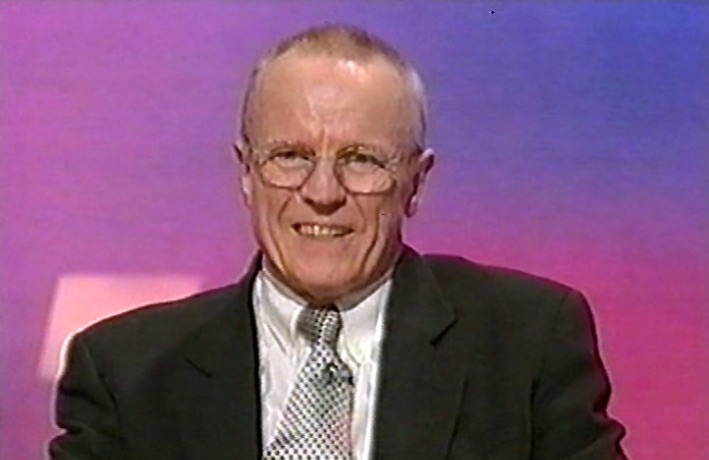
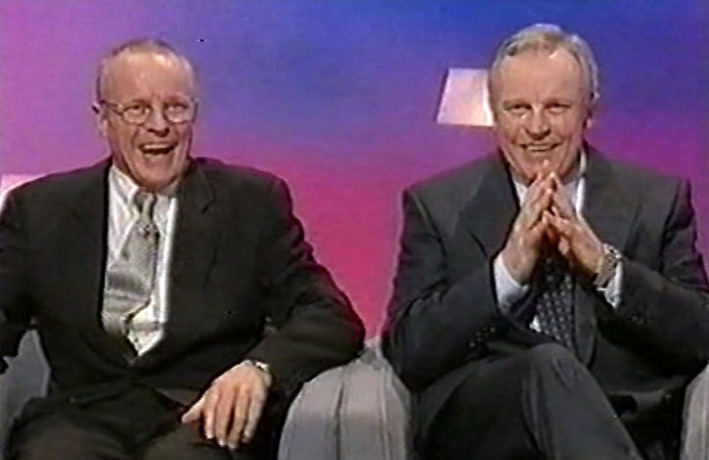
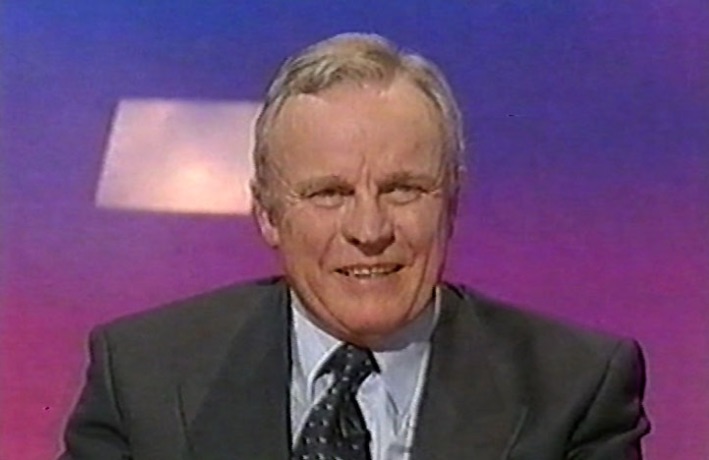
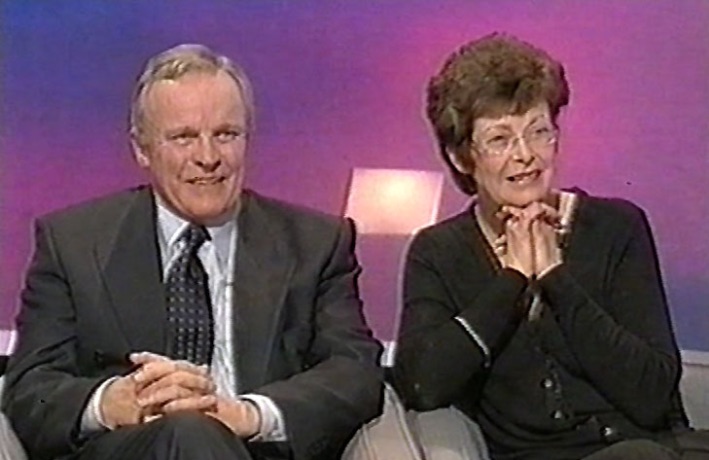




Photographs and screenshots of Ray and Trevor Powles This Is Your Life
South London News Shopper 26 February 2002
Two leading lights in cancer research and treatment at the Royal Marsden were caught totally unawares by Michael Aspel and his big red book.
Professors Trevor and Ray Powles now lay claim to being the only twins to have ever featured on the BBC's long-running TV show This Is Your Life [Bigredbook.info editor: Twin sisters Teddie and Babs of The Beverley Sisters were featured as subjects in December 1969].
The highs and lows in the lives of the head of the breast cancer unit and his brother, the head of the Leukaemia and Myeloma Unit, were charted before an audience of friends, family and colleagues, as well as millions of viewers watching at home.
In a touching moment, Pat MacKay, one of Trevor's patients who was successfully treated for breast cancer, said: "When I was first told I had breast cancer, I felt very alone - but Trevor has this special capacity to make you feel that you are important. He always makes you feel like the most important person in his day."
Ian Cuneen, one of Ray's biggest success stories became Europe's first successful bone marrow transplant patient in 1973 at the age of seven. He said he owed his life to Ray.
Royal Marsden chief executive Cally Palmer also paid tribute: "We're indebted to them. Their dedication, compassion and focus to improve treatments and find cures represents all that is good about the NHS."
To help celebrate the twins' lives were chart toppers Westlife who have thrown their weight behind the Marsden, and Chelsea footballers Gianfranco Zola and defender Marcel Desailly.
News Shopper 8 March 2002
Doctors Trevor and Ray Powles, this is your life...
To patients they are lifesavers, to colleagues they are heroes, but in their minds they are humble ambassadors of the National Health Service. They are identical twins, Doctors Trevor and Ray Powles, who between them have dedicated 76 years of their lives to saving lives.
These two stars, based at the Royal Marsden in Sutton, seem to shine through the clouded perception of today's health service, a reminder of what is right with the 53-year-old NHS.
In their honour, This Is Your Life, the TV show which charts the high and lows of the lives of the elite, made the brothers its subject.
It was supposed to be a heavyweight interview for the BBC's NHS day, in which the head of the breast cancer unit and the head of the leukaemia and myeloma unit would deliver a positive message about the latest treatments and current research being carried out. But when Trevor felt a microphone nudging into his left elbow, he realised something was up.
What are the sound technicians doing? thought Trevor. This is all going horribly wrong. But when he turned around, there was Michael Aspel cradling the big red book, a kind of Oscar for the deserving and accomplished.
The brothers were in shock.
"I was taken completely and utterly by surprise," said Trevor. "I would not have thought it in a million years."
"It was completely bizarre because I was very focused. I thought I was talking about the health service and then there was a microphone being stuffed under my left elbow. It probably took about two days before it actually sunk in."
The pair were first asked if they would accept the invitation before being whisked off to Teddington Studios where they were locked away in a room until the start of the show.
In all the hundreds of episodes filmed since the show's launch in 1955, only three individuals have ever refused to take part. Two eventually caved into persuasive arguments after an hour or so but only one stood his ground the recently deceased Spike Milligan, hailed a comic genius but known also as a man tormented by manic depression.
For the Powles, who are both family men with seven children between them, there was no other option than to dive straight into the big party awaiting them.
"I did not realise the extent of the research. There were 100-or-so people there. It was like a big party," says Trevor, who lives in Chipstead.
"I have done quite a lot of TV interviews, but this was the first non-pressured one. It was a lot of fun to go through the door and see all those familiar faces."
Ray, from nearby Banstead, was equally surprised and delighted by the result.
"I saw it on a monitor and it looked like we were enjoying ourselves. I thought the whole evening was going to end up as moans and groans, but instead it was about the dedicated hardworking NHS staff who love what they are doing."
There was another totally unexpected surprise for Ray a personal video message from Gianfranco Zola, Chelsea footballer and Ray's hero.
The night, it seemed, was to be about heroes. Former patients lined up on the show to publicly thank the two brothers for saving their lives.
Pat MacKay, who was successfully treated for breast cancer by Trevor, said: "When I was first told I had breast cancer I felt very alone - but Trevor has this special capacity to make you feel you are important. He always makes you feel like the most important person in his day."
Ray, who in 1973 performed Europe's first successful bone marrow transplant on seven-year-old Ian Cuneen, was told by his former patient he owed him his life.
There was also the amazing tale of how Ray was able to use bone marrow from a father to treat his son for leukaemia. Then, years later after the father was diagnosed with cancer, the boy was able to return the favour.
While this was a special moment, Ray's voice softened as he described the most intense part of his job.
"For me, it is sitting in a room with the relatives of a patient who has just died, trying to scramble around for anything which can make it better."
He and his brother, said Ray, are not the heroes.
"We are ambassadors for the 1.3 million health workers. The real heroes are those unsung ones the shop floor workers, cleaners, porters and nurses."
"When you see things like the airlines, people are trained and tutored for the corporate product and it is so bloody obvious. In the health service we do not train people to care. They do it because they know people need help."
Their beliefs, it seems, make them ambassadors of the highest order. They are able to convey a sense of optimism for the future of the NHS through their unflinching belief in it as an institution.
While unperturbed to admit there are problems in the NHS, which has come under increasing fire in recent years, there is this overriding optimism.
"I'm very positive for the health service," said Trevor. "I know there are bad things, I know people are kept waiting on trolleys, but the health service, as an institution, is fantastic. Two-thirds of the health service is good it is free at the point of entry to all, which is terrific. The problem is all this negative press. If you only have bad news, it looks like we are pouring money down drains. The bad press lowers morale and that is the single most important factor. If you lower morale that will destroy the health service."
So whether heroes or ambassadors, the message from Ray and Trevor rings more loudly than any PR spin: in order to save the service, the public at large and the media in particular need to reach out and give the doctors, nurses and all those who work alongside them, the pat on the back that they deserve.
Series 42 subjects
Michael Winner | Shaun Williamson | Paddy Ashdown | Tim Smit | Babs Powell | Saeed Jaffrey | Paul Young | Julian ClaryJonah Lomu | Rosemary Conley | Ian Woosnam | Bill Oddie | Fern Britton | Nick Ross | Ray and Trevor Powles
Stephanie Cook | Ian Lavender | Jenny Seagrove | Anita Dobson | Henry Sandon | Linda Barker | Brigit Forsyth
Christina Noble | Claire Sweeney | Lloyd Scott | Julian Fellowes